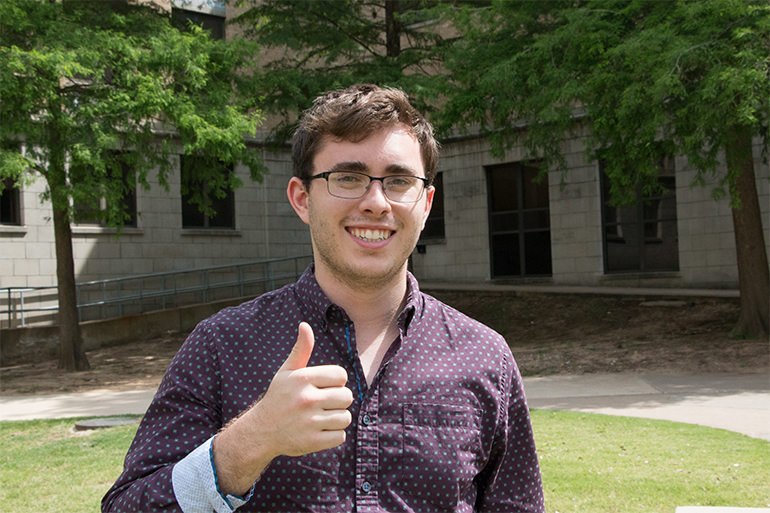
Texas A&M University Department of Mechanical Engineering graduate student Cole Fincher has been selected for the prestigious National Science Foundation (NSF) Graduate Research Fellowship Program, an honor bestowed upon only the most outstanding graduate students pursuing research-based master’s and doctoral degrees.
Fincher said he will remain at Texas A&M as he pursues his graduate education in mechanical engineering. He plans to continue researching small-scale mechanics and nanoindentation, which he described as poking small objects with a small stick to investigate how materials behave at the nano and micro scale.
“It's nice to be able to have some certainty of what's going to happen over the next few years,” Fincher said. “Every day is exciting here. We have many interesting projects in the lab that I'm working on. It's fun, it's like a little puzzle you have to figure out each day.”
He said the news of his selection brought with it a mixture of excitement and relief for the possibilities the program’s funding would provide him over the next few years.
Fincher and his peers will receive a three-year annual stipend, and a cost of education allowance to help cover tuition and fees. Fellows also have additional opportunities for professional development and international research through the program.
Fincher, who graduated with an bachelor’s degree in December, is co-advised by Dr. Matt Pharr, assistant professor in the mechanical engineering department, and Dr. George M. Pharr IV, Texas A&M Engineering Experiment Station (TEES) Distinguished Research Professor and professor in the Department of Materials Science and Engineering.
Matt Pharr said Fincher is a great student who has made positive contributions, not only in the lab, but through entrepreneurial and outreach activities such as demonstrations for elementary school students as well.
He said Fincher’s research interests have the potential for broad impacts in several areas, including sustainable energy storage, electric vehicles and more.
Through the aid of the fellowship program, Matt Pharr said Fincher will be able to have the flexibility to pursue the research that most interests him rather than being tied only to the projects for which he can gain funding.
“He’s going to get to explore on his own,” Matt Pharr said. “He’s enthusiastic and energetic and he loves doing academic and scientific work. Cole deserves this award, and it is a great opportunity for him.”
Fincher said he believes his selection for the fellowship program is also a reflection of Matt Pharr’s mentorship, which he said has played an integral role in his development as a researcher and as a student.
Established in 1952 the fellowship program was designed to recognize and provide support to students in NSF-supported engineering, technology, science and mathematics disciplines with the goal of helping to produce subject matter experts who can make significant contributions to teaching, research and innovations. It has funded more than 50,000 fellowships since its inception. More than 450 of the program’s fellows are members of the National Academy of Sciences, and 42 have become Nobel laureates. Previous fellows of the program include Google founder Sergey Brin, Freakonomics co-author Steven Levitt and former U.S. Secretary of Energy Steven Chu, who is a distinguished lecturer with the Hagler Institute for Advanced Study at Texas A&M.
As he moves forward as a fellow in the program pursuing his graduate education, Fincher said he hopes to publish as much as he can and take advantage of having the extra time to spend on research.
“I think that's why the fellowship is so impactful -- it frees up a lot of time that you otherwise would have to spend acting as a teaching assistant or fulfilling other duties to fill that funding gap,” Fincher said. “So now I'm freed up to focus more time on my research, which I enjoy a lot.”